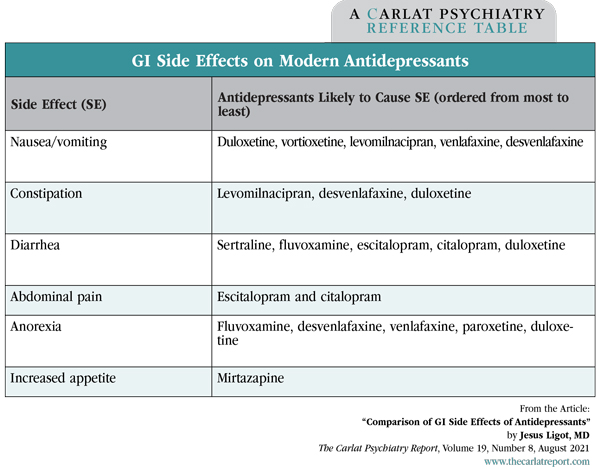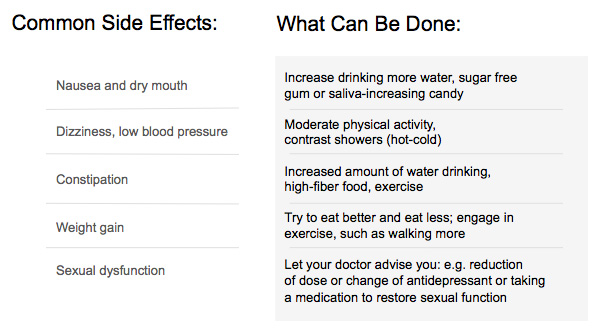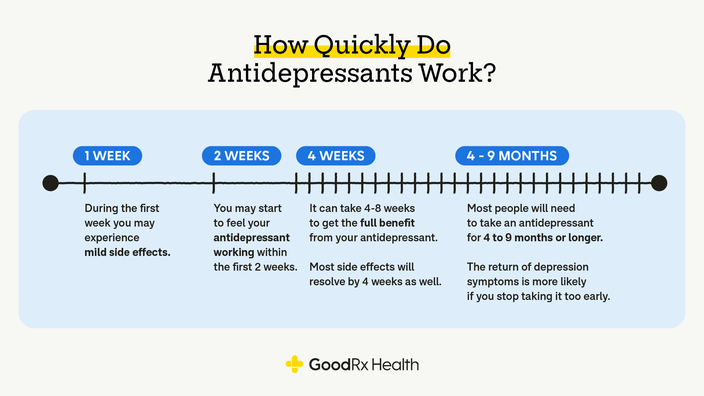
Understanding Different Types of Antidepressants and Their Side Effects

Antidepressants are commonly prescribed medications used to treat depression and anxiety disorders. There are several different classes of antidepressants, and each has its own set of potential side effects. Below, we’ll explore the most common classes of antidepressants, their side effects, and important safety information to consider when using them.
Classes of Antidepressants:
- SNRIs (Serotonin-Norepinephrine Reuptake Inhibitors)
- TCAs (Tricyclic Antidepressants)
- MAOIs (Monoamine Oxidase Inhibitors)
- SARIs (Serotonin Antagonists and Reuptake Inhibitors)
- Bupropion
- Mirtazapine
- Vilazodone
- Vortioxetine
Here’s a breakdown of the common side effects associated with these classes:
| Side Effect | SNRIs | TCAs | MAOIs | SARIs | Bupropion | Mirtazapine | Vilazodone | Vortioxetine |
|---|---|---|---|---|---|---|---|---|
| Headache | ✔ | ✔ | ✔ | ✔ | ✔ | ✔ | ||
| Diarrhea | ✔ | ✔ | ✔ | ✔ | ✔ | ✔ | ||
| Dry Mouth | ✔ | ✔ | ✔ | ✔ | ✔ | ✔ | ✔ | ✔ |
| Fatigue | ✔ | ✔ | ✔ | ✔ | ✔ | ✔ | ✔ | |
| Sweating | ✔ | ✔ | ✔ | |||||
| Dizziness | ✔ | ✔ | ✔ | ✔ | ✔ | ✔ | ✔ | |
| Blurred Vision | ✔ | ✔ | ||||||
| Sexual Issues | ✔ | ✔ | ✔ | ✔ | ✔ | |||
| Drowsiness | ✔ | ✔ | ✔ | ✔ | ✔ | ✔ | ✔ | |
| Insomnia | ✔ | ✔ | ✔ | ✔ | ✔ | |||
| Weight Gain | ✔ | ✔ | ✔ | ✔ | ✔ | |||
| Weight Loss | ✔ | ✔ | ✔ |
Potential Risks and Side Effects of Antidepressants

When starting any antidepressant, it’s important to be aware of both the common and less common side effects. While many of these side effects are temporary and improve as your body adjusts to the medication, others may require attention from your healthcare provider.
Suicidal Thoughts and Behaviors Risk

Some antidepressants, especially SSRIs, have been associated with an increased risk of suicidal thoughts or actions, particularly in children, teenagers, and young adults. This risk is highest during the first few months of treatment or during dosage changes. It’s crucial to monitor for any new or sudden changes in mood, behavior, or thoughts, and communicate these changes to your healthcare provider immediately.
Suicide Prevention Tips:

If you or someone you know is at immediate risk of self-harm or harming others:
- Call 911 or your local emergency number immediately.
- Stay with the person until help arrives.
- Remove harmful objects such as guns, knives, and medications from the vicinity.
- Listen, but avoid judging, arguing, or threatening.
If you are struggling, reach out for help by calling or texting the 988 Suicide and Crisis Lifeline at 988 or visiting 988Lifeline.org for support.
When Should You Start Antidepressant Medication?

Lifestyle changes, including diet and exercise, can help manage some symptoms of depression, but medications may still be necessary for many people. Typically, medication is recommended when:
- Your cholesterol levels or mental health symptoms are severe enough to risk cardiovascular or mental health complications.
- You have conditions like diabetes, which increase your risk for other health problems.
- Your cholesterol or blood pressure has been diagnosed as dangerously high.
If you’re experiencing any side effects or concerns about your medication, talk to your healthcare provider, who can adjust your treatment plan accordingly.
Frequently Asked Questions (FAQs)
- Are side effects from antidepressants permanent?
- Most side effects are temporary and go away after your body adjusts to the medication. If you experience persistent or severe side effects, consult your doctor.
- Can I stop antidepressant medication suddenly?
- Stopping antidepressants abruptly can lead to withdrawal symptoms. Always consult your healthcare provider before making any changes to your medication regimen.
- Can lifestyle changes reduce the need for antidepressants?
- Lifestyle changes such as exercise, a healthy diet, and proper sleep can significantly help manage depression and high cholesterol. However, some people may still require medication for optimal health.
- How do I know which antidepressant is right for me?
- It’s important to work closely with your healthcare provider to determine which medication is best for your specific needs. They will consider your symptoms, medical history, and any potential drug interactions.
By making informed decisions and working with your healthcare provider, you can take control of your health and make the best choices for managing your cholesterol and mental well-being.
Conclusion
Managing cholesterol and mental health can be challenging, and medications play a crucial role in improving both. However, each antidepressant has its own side effects, which can vary from person to person.
By understanding the potential side effects, regularly monitoring your condition, and maintaining open communication with your healthcare provider, you can manage your health more effectively.

